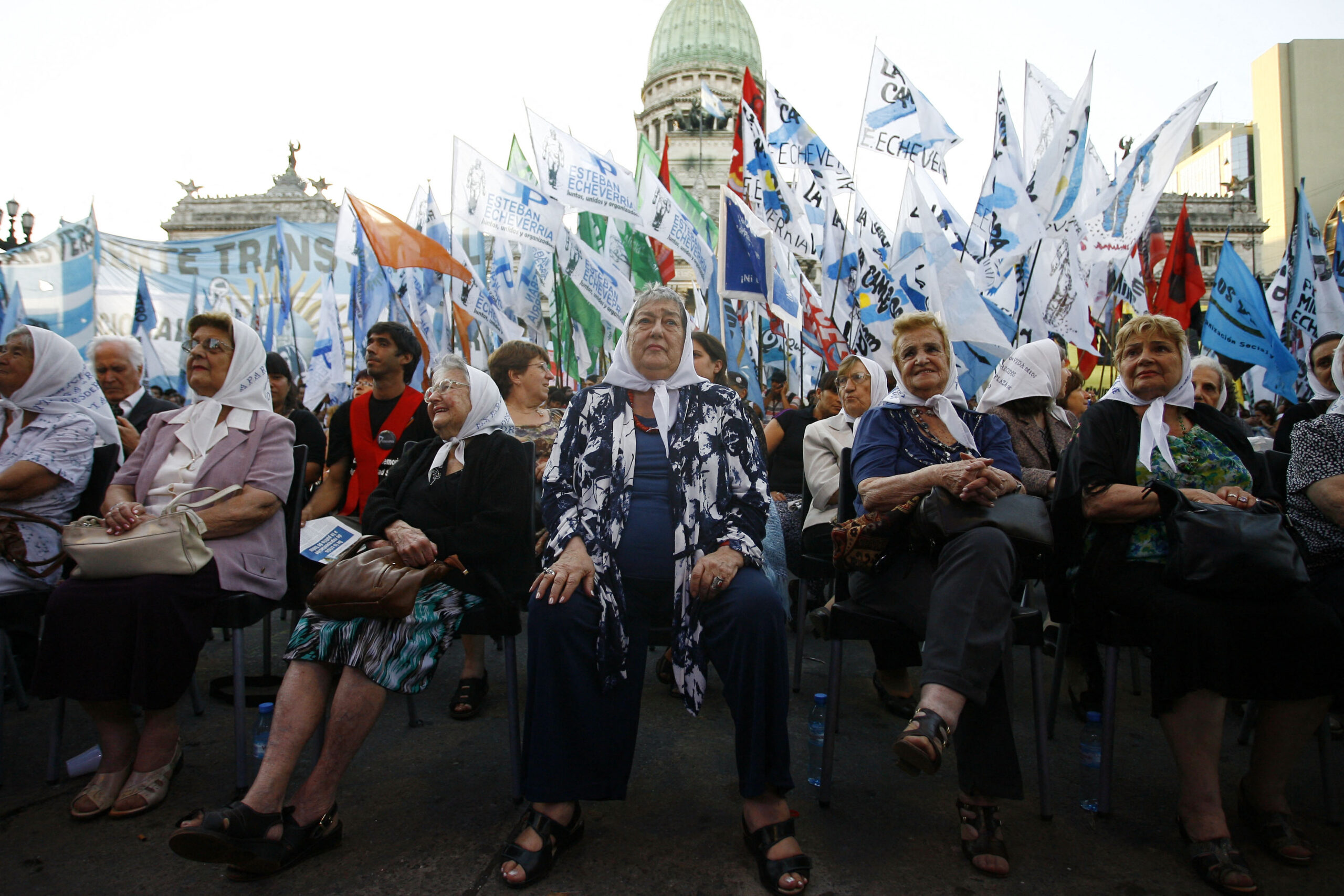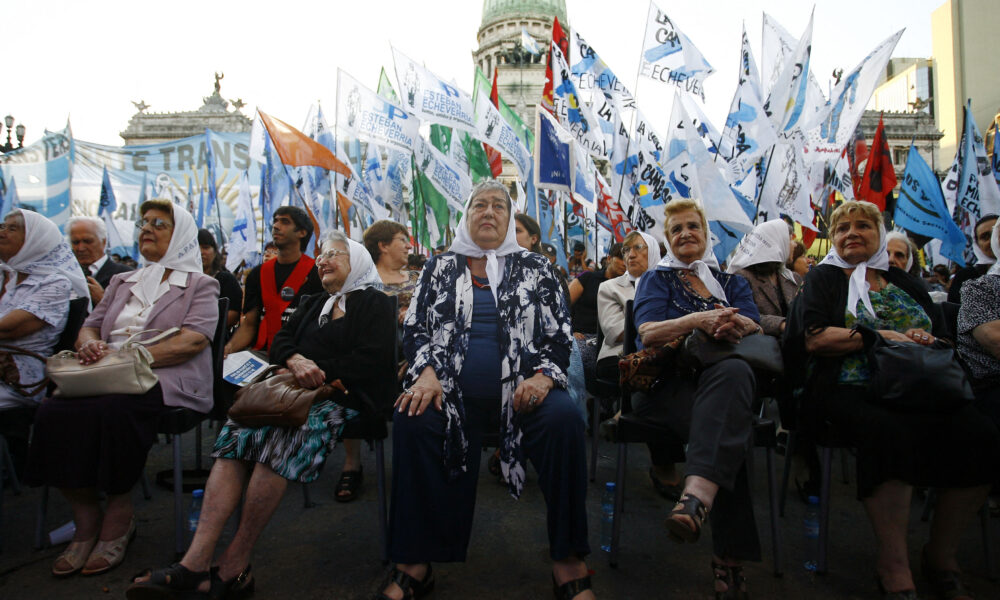International
Decades on, search continues for Argentina’s ‘stolen’ children

AFP
The Grandmothers of Plaza de Mayo are getting old. Every day the hopes of finding their grandchildren, who were stolen and given up for adoption under Argentina’s dictatorship, are fading.
As many as 500 children were taken from their imprisoned mothers, most of whom then disappeared under the country’s brutal 1976-1983 military rule.
Most of the children were gifted to people close to the dictatorship, keen to have them raised as regime loyalists.
Only about 130 have so far been found, and the search for the others — now adults in their 40s and 50s — continues.
The Grandmothers of Plaza de Mayo is an organization founded in 1977 by women trying to find their arrested daughters — and the babies they bore in captivity.
These “abuelas” take their name from the Plaza de Mayo square in Buenos Aires where brave women held protests to demand information on the whereabouts of their loved ones. They did so in vain.
As the original grandmothers get older, the organization has since been populated by a younger generation of researchers and councillors.
The rights body holds regular public meetings in the hopes of reaching people who may have questions about who they are — questions that can be difficult to confront — and convincing them to come forward.
Those who successfully go through a verification process can have their stolen identities “restituted.”
But it is an increasingly difficult endeavor. As time goes on, those who think they may be the children of disappeared women are ever less likely to come forward.
“They come to us in various stages of doubt, some have carried the burden in silence for 20 years, sometimes more, without talking to anyone — not even their spouse,” Laura Rodriguez, coordinator of the Grandmothers’ identity project told AFP.
Doubts can be triggered by a lack of physical resemblance to their parents, the absence of photos of their mothers while pregnant, or holes in the family history.
Some make several appointments for a consultation, but never show up.
Since June 2019, there have been no new restitutions, due in large part to the coronavirus pandemic putting the brakes on the Grandmothers’ activities — research and interviews with potential victims.
Six of the original grandmothers died during the pandemic.
‘Leap into the unknown’
At Moron, some 40 kilometers (25 miles) from Buenos Aires, six outreach meetings are planned by the Grandmothers and Argentina’s human rights ombudsman for the coming weeks.
But taking that first step is not easy.
“It is a leap into the unknown,” said Guillermo Amarilla Molfino, once known as “Grandson No 98” who said it took him years to seek help and then go through the restitution process.
He was reunited with his brothers, and has acted as an adviser to the Grandmothers outreach team.
“There are many fears, there is guilt, this guilt that makes us stay quiet: ‘Why do I doubt my parents, why do I betray those who gave me food, a roof over my head?’” he remembers of his own experience.
“Silence can become an ally with which one lives,” added Molfino. And finally accepting you are not who you thought you were can “feel like handing over your life” to someone else.
It is a difficult task for the researchers too, said Luciano Lahiteau, one of the Grandmothers team.
One needs to carefully balance an empathetic shoulder, he explained, with the “duty, not necessarily pleasant, of… picking out the reliable information from what a person tells us.”
Lottery, or loss
Lahiteau and other researchers take the volunteers’ stories and documentation, when available, and check these against civil and hospital registers, and evidence gathered from military trials.
If evidence for a match turns up, DNA can be cross-checked with a data bank holding genetic information on many, though not all, of the families searching for a missing grandchild.
When a match is found, “it is like winning the lottery!” said Rodgriguez.
But more often than not, hopes are dashed.
“We receive a lot of people who are not children of disappeared” women, said Rodriguez.
Yet, even for those who go through the process in vain, “it does a lot for identity,” said Lahiteau.
“It makes it possible to recognize: ‘OK, I am someone who has doubts about my identity; I have the right to try and find out where I come from,” he explained.
“Really, every person comes out of the process better than they entered,” added Rodriguez.
International
U.S. Senate Rejects Budget, Bringing Government Closer to Shutdown Amid DHS Dispute

The U.S. Senate voted on Thursday against a budget proposal in a move aimed at pressuring changes at the Department of Homeland Security (DHS), following the killing of two civilians during a deployment of immigration agents in Minneapolis.
All Senate Democrats and seven Republican lawmakers voted against the bill, which requires 60 votes to advance, pushing the country closer to a partial government shutdown that would cut funding for several agencies, including the Pentagon and the Department of Health.
The rejection came as Senate leaders and the White House continue negotiations on a separate funding package for DHS that would allow reforms to the agency. Proposed measures include banning Immigration and Customs Enforcement (ICE) agents from wearing face coverings and requiring them to use body-worn cameras during operations.
The vote took place just hours after President Donald Trump said he was “close” to reaching an agreement with Democrats and did not believe the federal government would face another shutdown, following last year’s record stoppage.
“I don’t think the Democrats want a shutdown either, so we’ll work in a bipartisan way to avoid it. Hopefully, there will be no government shutdown. We’re working on that right now,” Trump said during a Cabinet meeting at the White House.
International
Trump Says Putin Agreed to One-Week Halt in Attacks on Ukraine Amid Extreme Cold

U.S. President Donald Trump said on Thursday that he secured a commitment from Russian President Vladimir Putinto halt attacks against Ukraine for one week, citing extreme weather conditions affecting the region.
“Because of the extreme cold (…) I personally asked Putin not to attack Kyiv or other cities and towns for a week. And he agreed. He was very pleasant,” Trump said during a Cabinet meeting broadcast by the White House.
Trump acknowledged that several advisers had questioned the decision to make the call.
“A lot of people told me not to waste the call because they wouldn’t agree. And he accepted. And we’re very happy they did, because they don’t need missiles hitting their towns and cities,” the president said.
According to Trump, Ukrainian authorities reacted with surprise to the announcement but welcomed the possibility of a temporary ceasefire.
“It’s extraordinarily cold, record cold (…) They say they’ve never experienced cold like this,” he added.
Ukrainian President Volodymyr Zelensky later commented on the announcement, expressing hope that the agreement would be honored.
International
Storm Kristin Kills Five in Portugal, Leaves Nearly 500,000 Without Power

Storm Kristin, which battered Portugal with heavy rain and strong winds early Wednesday, has left at least five people dead, while nearly half a million residents remained without electricity as of Thursday, according to updated figures from authorities.
The revised death toll was confirmed to AFP by a spokesperson for the National Emergency and Civil Protection Authority (ANPEC). On Wednesday, the agency had reported four fatalities.
Meanwhile, E-Redes, the country’s electricity distribution network operator, said that around 450,000 customers were still without power, particularly in central Portugal.
Emergency services responded to approximately 1,500 incidents between midnight and 8:00 a.m. local time on Wednesday, as the storm caused widespread disruptions.
The Portuguese government described Kristin as an “extreme weather event” that inflicted significant damage across several regions of the country. At the height of the storm, as many as 850,000 households and institutions lost electricity during the early hours of Wednesday.
Several municipalities ordered the closure of schools, many of which remained shut on Thursday due to ongoing adverse conditions.
Ricardo Costa, regional deputy commander of the Leiria Fire Brigade, said residents continue to seek assistance as rainfall persists.
“Even though the rain is not extremely intense, it is causing extensive damage to homes,” he noted.
In Figueira da Foz, a coastal city in central Portugal, strong winds toppled a giant Ferris wheel, underscoring the severity of the storm.
-

 International4 days ago
International4 days agoFootball Fan Killed in Clashes After Colombian League Match
-

 Central America4 days ago
Central America4 days agoGuatemala President Says Starlink Terminal Found Inside Prison
-

 International3 days ago
International3 days agoU.S. Senate Rejects Budget, Bringing Government Closer to Shutdown Amid DHS Dispute
-

 International4 days ago
International4 days agoRubio Says U.S. Could Participate in Follow-Up Russia-Ukraine Talks
-

 International4 days ago
International4 days agoMissing Spanish Sailor Rescued After 11 Days Adrift in Mediterranean
-

 Central America2 days ago
Central America2 days agoPanama Supreme Court Strikes Down Panama Ports Concession as Unconstitutional
-

 International3 days ago
International3 days agoStorm Kristin Kills Five in Portugal, Leaves Nearly 500,000 Without Power
-

 Central America2 days ago
Central America2 days agoU.S. and Guatemala Sign Trade Deal Granting Zero Tariffs to Most Exports
-

 International3 days ago
International3 days agoMan Arrested After Vehicle Crashes Into Jewish Institution in Brooklyn
-

 International3 days ago
International3 days agoTrump Says Putin Agreed to One-Week Halt in Attacks on Ukraine Amid Extreme Cold




























